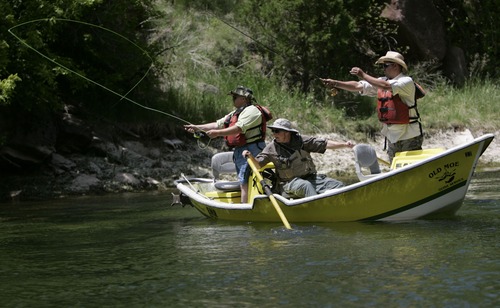This is an archived article that was published on sltrib.com in 2013, and information in the article may be outdated. It is provided only for personal research purposes and may not be reprinted.
A Utah lawmaker is looking to Idaho's stream-access laws to help resolve a long-simmering dispute over whether anglers, boaters and other recreational river users can stand or walk in riverbeds where the water flows over private land.
The unnumbered bill, expected to be introduced this week under the title "Public Waters Access Act," would enable limited public access to Utah streams over private lands, but only those capable of floating a 6-foot log at high water, according to sponsor Rep. Dixon Pitcher, R-Ogden.
"This protects private property rights, but it asks for access to existing public rights of way. It does not condone trespass," Pitcher said. "It doesn't condone littering or property damage. It supports river cleanup and rehabilitation."
The measure would reel back in some of the public access lost in 2010 with the enactment of HB141, sponsored by Rep. Kay McIff, R-Richfield, which enabled property owners to bar anglers and other river users from walking on the stream beds crossing their property. The new bill replaces key provisions of HB141, according to attorney Craig Coburn, who helped adapt Idaho's statute 36-1601 for Pitcher's bill.
HB141 sparked the formation of the river-user group Utah Stream Access Coalition, which retained Coburn to sue in Heber City's 4th District Court, which covers popular stretches of the trout-filled Provo River, in an attempt to invalidate that law.
Coburn said if Pitcher's bill is passed and signed into law, his clients would dismiss their case, currently awaiting a judge's ruling, and a related suit in Weber County.
The Idaho rule is based on the idea that navigable waterways are public transportation corridors that the members of the public have a right to use as long as they enter and exit where there is a public right of way.
"If it can't float the log, it's too small to be used and there is no conflict. I'm a great believer in property rights, but the water belongs to the public," Pitcher said. "It's an excellent compromise that both parties can live with. Everybody doesn't get exactly want they want but they get close to what they want."
His bill will be publicly unveiled Friday on the Capitol steps in conjunction with a stream-access rally that will also denounce McIff's pending HB68, which would limit the reach of the public-trust doctrine.
"We believe our access is protected by the public-trust doctrine, which the courts are currently evaluating. HB68 would restrict the courts from doing that," said Utah Stream Access Coalition President Kris Olson, who called the Idaho model "instructive."
"Their law includes protections for access as well as for private property," Olson said. "It is a compromise that has been on the books and working for Idaho for over 35 years."



